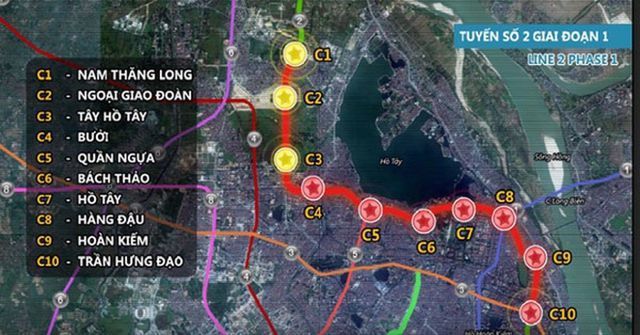 |
|
Nam Thang Long-Tran Hung Dao Urban Railway Project
|
According to the report of the Ministry of Planning and Investment, the Nam Thang Long-Tran Hung Dao Urban Railway Project was approved in November 2008. It is 11.5km long with 8.5km underground part and 3km elevated section. It would start at Ciputra urban area and end at Hue Street.
The cost is VND19.5trn (USD838m) with ODA from Japanese reciprocal capital. Hanoi Urban Railway Management Board is the investor and the project was supposed to be put into use in 2017.
Hanoi authorities recently asked the prime minister to increase the cost from VND19.5trn to VND35.7trn (USD1.5bn). This means each kilometre of the railway will cost USD143m. The project's scale, currency exchange, material costs and changes in policies are the main cause for the adjustment.
With the new cost and scale, Hanoi authorities have proposed to delay the completion date to 2027.
The Ministry of Planning and Investment said the adjusted numbers were reasonable and cited urban railway costs in other countries in the past 10 years. For example, the MRT Jakarta Project in Indonesia cost USD165.5m per km, or the Hangzhou 1 Project in China cost USD73m per km.
With the new adjustments, the speed of the train will be increased from 90 to 120km/h. The maximum speed will be 110km/h underground, 80km/h on elevated sections and 15km/h at the depots. The number of trains will be decreased from 14 to 10 in order to meet the targeted number of passengers and to ensure that the train will be reliable.
In September, Deputy Prime Minister Trinh Dinh Dung asked Hanoi authorities to follow the procedures when making adjustments to the project. He also asked Hanoi authorities to take full responsibility for the data including forecasted numbers. Local authorities were tasked to work with related agencies over the ODA loans. Dtinews

Urban railway helps reduce carbon emissions: JICA
JICA's survey has found urban railways are a form of transport with lower carbon emissions than cars and motorbikes.

Laying the tracks for Vietnam's railways
State-owned Vietnam Railways has begun to bet on a new venture with a Chinese giant in a bid to solve an impasse in financial performance. However, concerns remain over possible gains and losses from the new partnership model.
 Hanoi People's Committee have proposed to delay the Nam Thang Long-Tran Hung Dao Urban Railway Project until 2027 after proposing increased project investment.
Hanoi People's Committee have proposed to delay the Nam Thang Long-Tran Hung Dao Urban Railway Project until 2027 after proposing increased project investment.